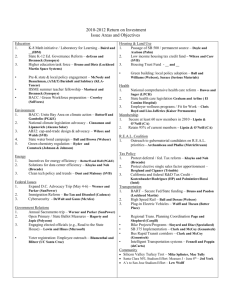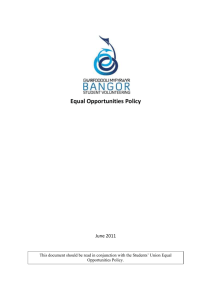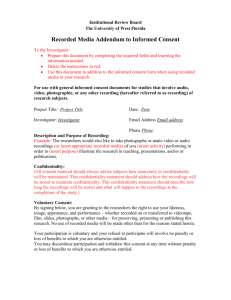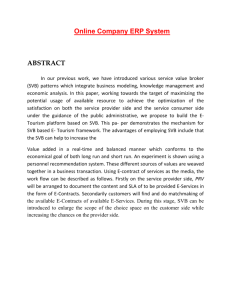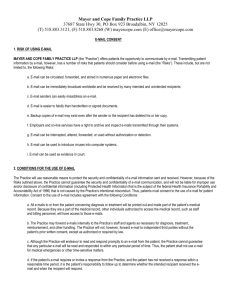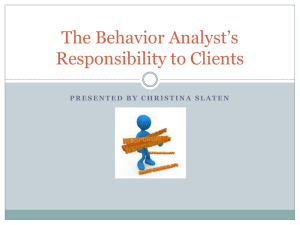Confidentiality and Data Protection Policy
advertisement
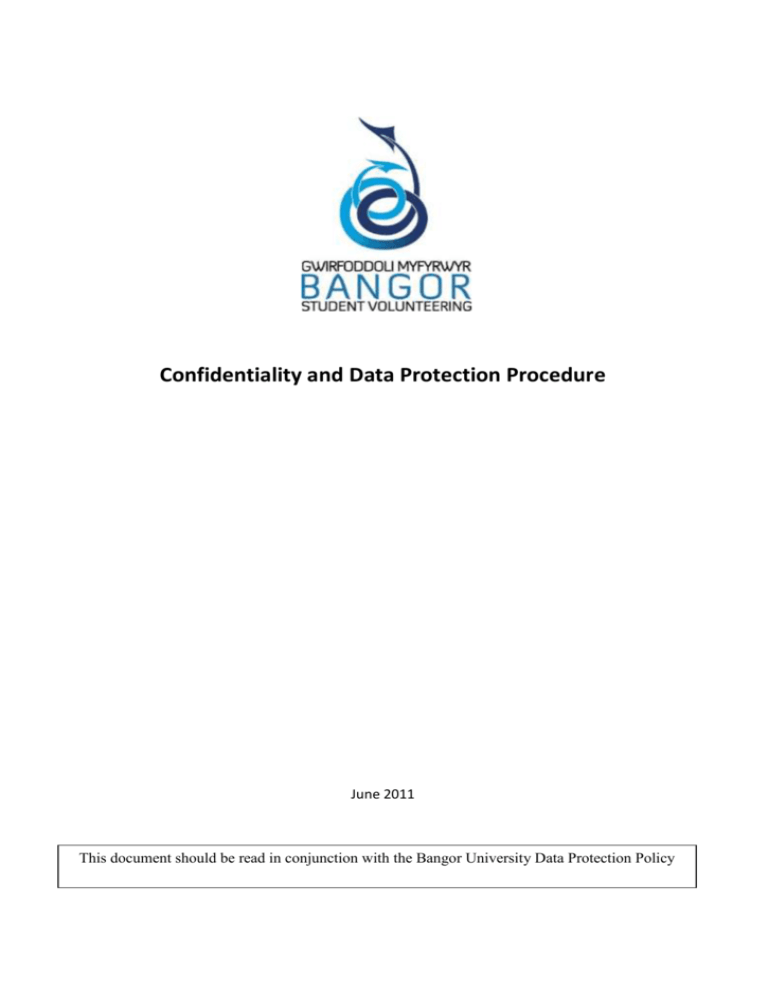
Confidentiality and Data Protection Procedure June 2011 This document should be read in conjunction with the Bangor University Data Protection Policy Student Volunteering Bangor Confidentiality and Data Protection Procedure 1. Background and the Commitment to Confidentiality Student Volunteering Bangor (SVB) holds all personal information under strict legal and ethical obligations of confidentiality. Information that is given in confidence will not be used for any purpose without consent. There are however, a number of important exceptions to this rule that are described in section 6 of this document but SVB will, in most circumstances, involve service-users and volunteers in decisions about the use of their personal information. Volunteers and service-users have the right to expect that SVB will hold information about them in confidence. Confidentiality is central to trust between service-users, volunteers and staff. The handling of personal information must: • promote, support and protect the privacy, dignity and rights of volunteers, staff and service users • command the support of volunteers, staff, service users and partner organisations • comply with the law • promote the welfare of volunteers, staff and service users and the effective operation of SVB 2. General Principles 2.1 All volunteers and staff are obliged to safeguard the confidentiality of personal information. The relevant legislation includes the Data Protection Act 1998 and the Human Rights Act 1998. All volunteers and staff must be aware that any breach of confidentiality may be a matter for disciplinary action or provide grounds for complaint or private legal action against Bangor University Student’s Union by the individual(s) concerned. 2.2 If individuals about whom information is kept are fully informed about the uses made of information given and provide consent for their details to be used in this way, it is not necessary to seek specific consent each time information is passed on. 2.3 Access to personal information will be controlled within SVB on a ‘need-to-know’ basis. When dealing with agencies not involved directly in the running of a particular SVB project it will be ensured that they are given no more than the minimum information required and no more than SVB can legally provide. 2.4 If an individual states that they do not wish for their personal information to be shared, their wishes will be respected unless there are exceptional circumstances (see section 6). 2.5 Information supplied for one purpose will not be used for another purpose. 2.6 Where possible, information will be shared in economised form. 3. Consent of the Individual 3.1 At the beginning of a period of contact with a volunteer or service user, the individual’s consent will be obtained in order to share information as far as is required by SVB for the purpose of their volunteering. 3.2 The volunteer or service user can change the terms of their consent or withdraw it completely at any time. This must be done in writing to the SVB Manager. 3.3 The volunteer or service-user will also be advised of the Exceptional Circumstances (see section 6) in which in may be necessary to share information without consent. The volunteer or service-user should be advised before the information is shared unless it would risk harm to another person or impede the investigation of a serious crime. 4. Children and Vulnerable Adults’ Information 4.1 Children, young people and vulnerable adults of all ages have the same right to confidentiality as everyone else. 4.2 If a child or vulnerable adult does not understand the consequences of confidentiality, you must explain to that individual that some information may need to be shared with people who have parental responsibility for that child or with other people, especially if there are exceptional circumstances. 5. Normal Limits of Information Sharing / Disclosure To run effective services, it will be necessary at times to share information between staff and volunteers directly involved in the provision for a service user. 6. Exceptional Circumstances in which Information may be Disclosed Without Consent Disclosure of an individuals’ personal information without consent may be justified where failure to do so may expose the volunteer, service user or others to risk of harm. The health and safety of the individual is considered more important than the right to confidentiality. Exceptional circumstances include: • Matters concerning Child Protection and the Protection of Vulnerable Adults: staff and volunteers should adhere to the SVB Child Protection and POVA Policies and the Protection of Children Act 1999. • Life threatening or dangerous situations, for example, where a person: - Shows signs of physical, emotional or sexual harm or trauma - Is at risk of harm or threatening suicide - Is threatening to kill or severely harm another person Or in / when • - The prevention, detection or prosecution of crime - The risk assessment of sex offenders - People are missing or for individuals who may be in need of protection - The prevention of or reduction of risk to personal or public health There is a legal obligation to provide information in the following circumstances: - 7. Requirement by a court / police Procedure for Disclosure or Sharing of information to Other People in Exceptional Circumstances Prior to sharing information outside of normal limits, a volunteer or member of staff should obtain advice from the SVB Manager and / or the Student’s Union Director. 8. Maintaining, Storing and Disposing of Personal Information 8.1 Care will be taken to ensure that personal information is protected against improper disclosure at all times. 8.2 In discussing details about volunteers and service users, it must be ensured that conversations cannot be overheard by anyone not bound by the same requirements of confidentiality towards that individual. 8.3 Material containing personal data will not be left where it can be seen by other service-users or individuals not bound by the same requirements of confidentiality towards that individual. 8.4 All portable records containing personal data will be kept in recognised filing and storage places. This storage should be locked at times when access is not directly controlled or supervised. 8.5 Computers with access to client information will be put into a password-protected mode when not in use and all personal information will have restricted access from individuals who are not bound by the same requirements of confidentiality towards the individuals on whom information is kept. 8.6 When it may be necessary to keep material with personal identifiable data in places other than the SVB office, it will be kept under the same secure conditions as other service-users' files. Information which will be required to leave the SVB office for whatever reason, will be kept to a minimum. For example, when a project takes place away from the office it is a Health and Safety requirement that certain details are kept in the event of an emergency. In these cases, only the required information will be kept in the portable files and those responsible for those files will be required to keep the information secure. 8.7 Personal information about a volunteer will be kept for 5 years after they leave SVB. This information will be kept on paper, however all records held on computer will be deleted the year that an individual leaves. Personal information about a service user will be kept on paper for one year and information kept on computer will be deleted during the year that the individual ceases to use the service. 8.8 Information held on paper will be disposed of by shredding. All information held on portable media i.e. on disk, will be destroyed. 9. Policy Review This procedure will be review annually and will next be reviewed in July 2012.

